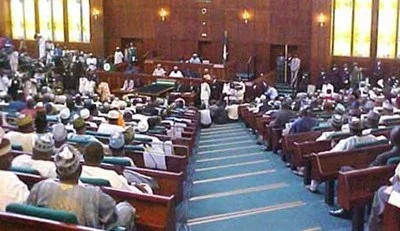L
LequteMan
Guest
The 2015 Appropriation Bill on Wednesday passed through the second reading at the House of Representatives.
The Bill was laid before the House by President Goodluck Jonathan, through the Finance Minister, Dr Ngozi Okonjo-Iweala, on Dec. 17, 2014.
The N4.36 trillion budget predicated on 65 dollars per barrel of crude oil benchmark, comprised N411.84 billion for statutory transfers, N943 billion for debt servicing and N2.61 trillion for recurrent expenditure.
It also has N387.11 billion as contribution to development fund for capital expenditure.
Leading the debate of the bill, Majority Leader of the House, Mulikat Akande-Adeola, explained why the lawmakers should favourably consider and pass the 2015 budget as presented.
According to her, the focus of the budget is continuous job creation through infrastructure development, particularly in the areas of power, roads, agriculture, youth empowerment in agriculture programme (YEAP), housing and construction, and creative industry.
"The budget is also designed to reduce costs in non-essential areas of expenditure, and as part of that, cost of governance is expected to reduce such that all trainings of civil servants will be done locally,’’ she said.
She added that it was also intended to stem corruption in the public service through adequately designed internal expenditure reduction mechanisms.
#Nigeria #2015

The Bill was laid before the House by President Goodluck Jonathan, through the Finance Minister, Dr Ngozi Okonjo-Iweala, on Dec. 17, 2014.
The N4.36 trillion budget predicated on 65 dollars per barrel of crude oil benchmark, comprised N411.84 billion for statutory transfers, N943 billion for debt servicing and N2.61 trillion for recurrent expenditure.
It also has N387.11 billion as contribution to development fund for capital expenditure.
Leading the debate of the bill, Majority Leader of the House, Mulikat Akande-Adeola, explained why the lawmakers should favourably consider and pass the 2015 budget as presented.
According to her, the focus of the budget is continuous job creation through infrastructure development, particularly in the areas of power, roads, agriculture, youth empowerment in agriculture programme (YEAP), housing and construction, and creative industry.
"The budget is also designed to reduce costs in non-essential areas of expenditure, and as part of that, cost of governance is expected to reduce such that all trainings of civil servants will be done locally,’’ she said.
She added that it was also intended to stem corruption in the public service through adequately designed internal expenditure reduction mechanisms.
#Nigeria #2015

